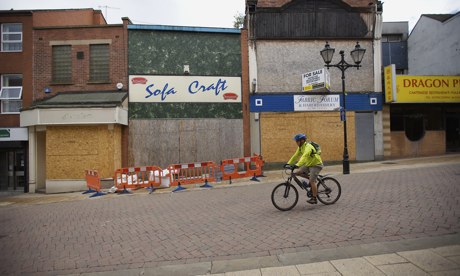
It has become a January ritual: the nation's retailers reporting one after another how they performed over the crucial Christmas period. Reputations – and share prices – hinge on these results when so much cash is splashed over the all-important festive season. This year's winners include Argos, Dixons and John Lewis, while Debenhams, Marks & Spencer and Morrisons are among those feeling the high street heat.
If there is one consistent theme, it is that stores with a strong online presence outgunned those laggards late to the internet. This is unsurprising: just look at Asos, the online fashion firm, whose British sales jumped more than one-third over the previous end of year. They underline the huge shift in shopping habits from trawling along high streets to clicking on computers.
The pace of this change is speeding up. A recent Ofcom study found Britons spend far more online than any other nation, with one in four shopping from keyboards each week and the world's most developed grocery shopping. Last month saw another leap of nearly one-fifth in online spending, the fastest increase in four years, with mobile phones and tablets alone accounting for 6% of total retail sales. Yet we are still in the infancy of the internet revolution.
This has major repercussions in a country where retailing is responsible for as big a chunk of the economy and workforce as manufacturing. It provides a precious opportunity for the most innovative stores and suppliers as the rest of the planet catches up. Above all, however, it underlines how fast the traditional British high street is dying.
This is a subject surrounded by stifling nostalgia – and indeed, some hypocrisy as people complain about shops shutting while buying books, shoes and food online. Yes, it would be lovely if shoppers all wandered down high streets, stopping at the butcher, baker and greengrocer. But the reality is rather different – when they leave their laptops, people turn to "destination" shopping centres, supermarkets and malls.
Consider the facts. As we emerge from recession one in seven shops are empty across Britain, with higher figures in Wales and the north of England. Some towns have more boarded up stores than Athens; more than a quarter are closed in Blackburn, for example. Others are filled with betting shops, pawnbrokers or, at best, charity outlets; their numbers have risen fast in recent years as they exploit favourable taxes and use volunteer staff.
One-third of high streets are degenerating, according to an official review – and two-thirds of small retailers are "zombie firms", relying on low interest rates to survive. Yet some see a rose-tinted solution in the spread of coffee shops and scented candles, reviving town centres with cafes, restaurants and independent outlets. The TV presenter Mary Portas, called in to advise the government, suggested the march of modernity could be stopped by better management, free parking and more market stalls. Meanwhile the amount spent on small business rate relief has almost tripled under the coalition.
Instead of fighting the future in this way, we must accept the internet is transforming towns just as it is transforming industries – not least by slaughtering scores of already sickly shopping streets. This may be painful for communities, like any change, but it is also an opportunity. For it could help tackle one of our most pressing national problems: the housing crisis, rightly moving up the political agenda after decades of failure by successive governments.
Britain has ended up with too many shops, the space they occupy having swollen rapidly in recent decades, and far too few homes. Yet given the outdated desire to protect high streets, it is very hard to convert shops into homes or other uses, so we have thousands of wasted properties in prime locations in our towns and cities. When interest rates rise, this imbalance may worsen despite the improving economy.
The government is consulting on loosening these strict planning restrictions, although it seems wedded to protecting "prime" streets. It needs to confront the nation's nostalgia, for instead of preserving the past we have to find news ways to energise town centres in the digital age. This can only be done when we accept the traditional high street, sadly, is already sepia-tinted history in many places.
Twitter: @ianbirrell

